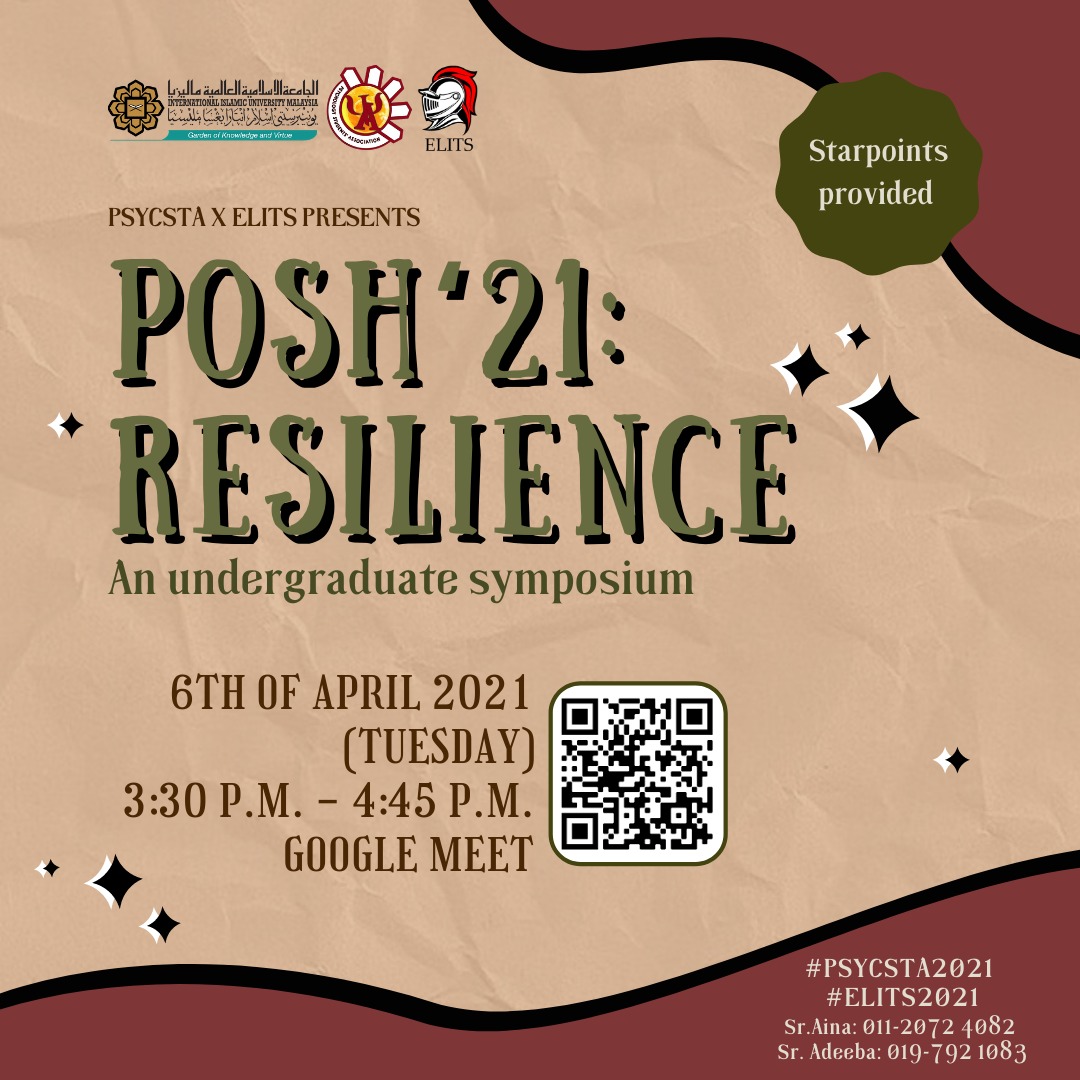By Nik Nayly and Ayuni Nabila
GOMBAK, 7 April 2021: As the saying goes, œlife doesn’t get easier or more forgiving, we get stronger and more resilient. It is time for us to be willing to acknowledge our struggles and rebuild our lives after a tragedy or a traumatic experience that we have faced in the past.Â
This was the subject discussed in the ˜POSH21: An Undergraduate Symposium on Resilience which was carried live yesterday (6 April).
The discussion centred around the subject of resilience in adversity. The abbreviation ˜POSH stands for poetry and short story which represents the goal of this symposium – to advocate well-being through writing.Â
Organised by the Secretariat of Psychology (PYSCTA) and co-organised by the Secretariat of English Language and Literature (ELITS), the symposium invites Mdm. Nur Aini Alegrea Suner, an academic member of the Department of Psychology and Clinical Psychologist, as the speaker.
Mdm. Nur Aini said that œadversity does not discriminate, people respond to adversity in different ways when presenting ˜To Live and Grieve: The Healing Power of Resilience.
According to Mdm. Nur Aini, people respond to adversity in different ways, which can be categorised under emotion-focused coping and problem-focused coping.
Emotion-focused coping refers to the action of denial, self-distraction, self-blame, and behavioural disengagement. This can be seen when people give up in the face of adversities. œThe most famous way of coping after a traumatic experience is through self-distractions, said Madam Nur Aini.
She added: œEmotion-focused ways of coping are the first phase of healing and it is not bad. We are allowed to deny, and behaviour-disengagement is allowed, but it is something temporary.”
Moving forward, some people bounce up and step up after a traumatic experience. Based on the explanation given by Mdm. Nur Aini, this is a problem-focused way of coping which can be done through acceptance, active coping, planning, positive reframing, and social support.
œResilience will not be complete without the support of other people, said Mdm. Nur Aini.
She also shared the three strategies to become resilient, which are the 3 Cs – Challenge, Commitment, Control. These strategies emphasise how individuals should be active agents through the healing process where they finally choose not to be a victim of the situation.
Following that, she emphasised that resilience is an ability because it is something you can learn and develop through your willingness. “Resilience is when we are willing to become vulnerable, but still living and moving forward as it is not a linear process.”
œChange is a painful and difficult process, but its something we need to do in order to become a better person, Mdm. Nur Aini shared.
She added: œThe most important thing is accepting and acknowledging your struggle.
The symposium also featured poem presenters, Nur Alia Kamelia Binti Kamalullail, an undergraduate student of Economics and Management Sciences, and Muhammad Bin Mustafa Kamal, an undergraduate Psychology student.
Nur Alia Kamelia recited the poem ˜Icarus, depicting Greek mythology while centre upon the theme of determination and resilience.
The detailed sufferings of Icarus intensify his act of perseverance, where Nur Alia Kamelia writes, œYoure the only one who ever tried which evokes the theme of resilience further.
The recitation continued with her second poem entitled ˜Comfort.
The floor was then given to Muhammad to recite his poem titled ˜Untitled.
The whole poem focused on an angel as its subject where literary devices such as hyperbole, imagery and simile were highlighted.
Besides that, there were also academic paper presentations by Amirah Binti Salhuddin, Ayuni Nabila Binti Zulkifli, and Fatin Syasya Binti Ahmad Fooad, who are all undergraduate students of English Language and Literature.
The first academic presentation was by both Amirah Salhuddin and Ayuni Zulkifli.
The main objective of their presentation was comparing the message of resilience in A. Samad Said’s ˜Hidup Bersama as the poem proposes straightforwardness while it carries a heavy sense of interpretation.
The theme was demonstrated in ˜Hidup Bersama, through national idealism towards the common goal of maintaining independence and the comparison between Rupert Brookes The Soldier and Wilfred Owens Dulce et Decorum Est.
As for the academic presentation by Fatin Syasya, she talked about the notion of resilience in Malaysian literary text from a 2015 short film by Mohd Yazied Suhaimi, ˜Kejar.
The film portrays the protagonists resilience in reaching his goals in life through various imageries, metaphors, and symbolisms.
Fatin Syasya highlighted that the portrayal of resilience in the film is in line with Islamic teachings on the concept of sabr.
The symposium was carried live on Google Meet with over 60 participants from among students and lecturers attending. ***
